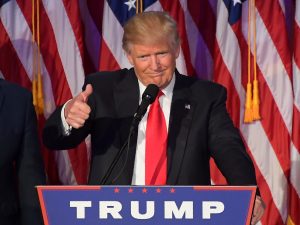
(Photo by JIM WATSON/AFP/Getty Images)
Pour one out for Eric Trump, perhaps the only person on earth who actually believed that a federal judge was going to seize jurisdiction from the New York state courts and order that mean Attorney General lady to quit investigating his family.
“This is what you’d expect from Russia. This is what you’d expect from Venezuela,” he howled to Sean Hannity about the the New York Attorney General (OAG), who is investigating questions like how the Trump Organization managed to get a $19 million conservation tax credit on the unimproved portion of a property assessed at $21 million including the ancestral mansion.

How 8am LawPay Takes The Sting Out Of Legal Billing
Getting paid can be an arduous task. You should make it as easy on yourself and your clients as possible.
Eric Trump says Letitia James suing Trump violates the constitution pic.twitter.com/x6R9HAJmMF
— Acyn (@Acyn) January 11, 2022
“It’s gonna stop, because frankly, we’ve assembled the best legal, ethical minds, and we’re going to sue her for this abuse of power,” young Eric promised in January, seemingly oblivious of the reality that he himself had been forced to testify just months before when the OAG sued him to force compliance with investigative subpoenas.
This walking proof of the Dunning-Kruger effect was absolutely certain that attorney Alina Habba — who is not regarded by her fellow Trumpland lawyers as one of “the best legal, ethical minds” — would be able to convince a federal judge to overrule the state court and permanently enjoin the OAG from investigating his family.

Meet Your New Team: Intuit QuickBooks Unveils The Power Of AI Agents For Business Growth
The future of business is here, and it's powered by QuickBooks.
Turns out … not so much. Because Younger abstention doctrine is not, in fact, the rule governing his father’s successive wives.
In a 43-page ruling issued today, US District Judge Barbara Sannes tossed Trump’s windmill tilt of a lawsuit seeking to have the federal judiciary seize jurisdiction from New York Supreme Court Justice Arthur Engoron, who has been presiding for upwards of a year over efforts by the OAG to get the Trump family to comply with her investigation.
“[T]he Court concludes that the interests underlying Younger require abstention in this instance. Interference with the state’s contempt process ‘unduly interferes with the legitimate activities of the State’ and can also ‘readily be interpreted as reflecting negatively upon the state courts’ ability to enforce constitutional principles,'” she wrote, referencing a 1977 Supreme Court decision affirming that federal courts should abstain from wading in on issues already being adjudicated by state judges.
Furthermore, even if Younger did not apply, the same parties have already litigated these same issues in state court, with Justice Engoron finding that the investigation was appropriately predicated and not simply a retaliatory exercise because Tish James doesn’t like Donald Trump. And despite what Eric Trump may think, res judicata isn’t a fancy flavor of Capri-Sun for an overgrown man-toddler to slurp at corporate board meetings when the grown ups are talking about boring math stuff.
The opinion is pretty thorough in its analysis, but still makes time to show exactly what the court thinks of the arguments put forth by Team Trump:
Finally, Plaintiffs noted, in one sentence without any elaboration, that “to the extent that the Court has any doubt as to whether Defendant’s investigation was commenced in bad faith, the Court should direct an evidentiary hearing on this issue.” (Dkt. No. 21, at 20). Although an evidentiary hearing is required where there is a disputed issue of fact regarding a Younger exception, see Kern v. Clark, 331 F.3d 9, 12 (2d Cir. 2003), Plaintiffs have failed to identify a disputed issue of fact here which would require an evidentiary hearing. The Court has accepted as true for the purpose of this decision the allegations in the complaint, and Plaintiffs have not filed any affidavits or evidence in support of their bad faith claim. As discussed above, animus is not itself sufficient to invoke the bad faith exception, and Plaintiffs’ conclusory allegations in the complaint that Defendant commenced the New York proceeding to retaliate or harass do not raise an issue of fact.
The court was similarly unimpressed with the attempt to invoke the special status of a sitting executive to demand a federal forum to air his claims.
The fact that a President “can raise subpoena-specific constitutional challenges, in either a state or federal forum,” id. at 2430, does not help Plaintiffs as Mr. Trump is no longer the sitting President. While Plaintiffs point out that Mr. Trump was President when both Defendant’s investigation and the New York proceeding were commenced, Mr. Trump has been out of office for over one year. The concerns discussed in Vance, including that compliance with a particular state criminal subpoena would “impede [the President’s] constitutional duties,” id., are therefore not present here.
Which brings this case to its inevitable but no less ignominious end. This would be the second defeat in 24 hours for the former president’s legal team, after the appellate court in New York affirmed Justice Engoron’s order that Don Jr, Ivanka, and their dad sit for deposition by the OAG.
Somebody may be “tired of winning,” as the former president famously promised. But it sure isn’t Donald Trump.
Trump v. James [Docket via Court Listener]
Liz Dye lives in Baltimore where she writes about law and politics.